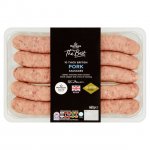Silverobama
Key Member
- Joined
- Aug 8, 2010
- Member Type
- Student or Learner
- Native Language
- Chinese
- Home Country
- China
- Current Location
- China
I'll meet a friend next week and I want to give him a new year gift. I bought two bags of sausages. One flavor is sweet and the other is spicy. Are my following sentences natural? I'll use the correct ones when I meet that friend.
1) I bought you some sausage as a new-year gift.
2) I bought you some sausages as a new-year gift.
3) Here are some sausages for your new-year gift.
4) Here are some sausage for your new-year gift.
I notice that "sausauge" is both countable and uncountable.
I think 1) and 2) are okay, but would you please help me to make the 3) and 4) natural too?
1) I bought you some sausage as a new-year gift.
2) I bought you some sausages as a new-year gift.
3) Here are some sausages for your new-year gift.
4) Here are some sausage for your new-year gift.
I notice that "sausauge" is both countable and uncountable.
I think 1) and 2) are okay, but would you please help me to make the 3) and 4) natural too?
